
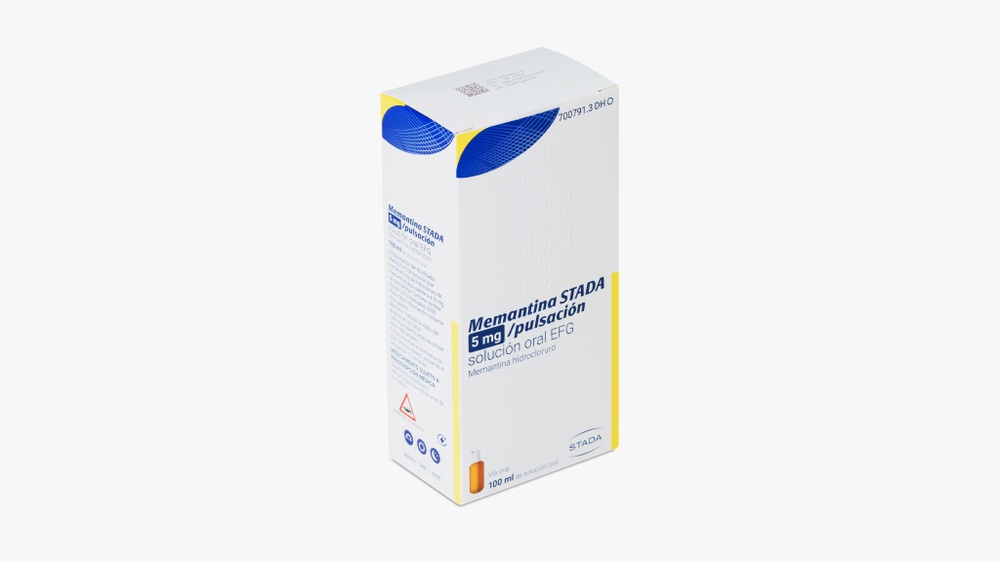
MEMANTINA STADA 5 mg/dose SOLUÇÃO ORAL

Pergunte a um médico sobre a prescrição de MEMANTINA STADA 5 mg/dose SOLUÇÃO ORAL

Como usar MEMANTINA STADA 5 mg/dose SOLUÇÃO ORAL
Introdução
PROSPECTO: INFORMAÇÃO PARA O UTILIZADOR
Memantina Stada5mg/pulsão,solução oral EFG
Hidrocloruro de memantina
Leia todo o prospecto atentamente antes de começar a tomar este medicamento, porque contém informações importantes para si.
- Conserva este prospecto, porque pode ter que voltar a lê-lo.
- Se tiver alguma dúvida, consulte o seu médico ou farmacêutico.
- Este medicamento foi prescrito apenas para si, e não deve dá-lo a outras pessoas, mesmo que tenham os mesmos sintomas que si, porque pode prejudicá-las.
- Se experimentar efeitos adversos, consulte o seu médico ou farmacêutico, mesmo que se trate de efeitos adversos que não aparecem neste prospecto.
Conteúdo do prospecto
- O que é Memantina Stada e para que é utilizado
- O que precisa saber antes de começar a tomar Memantina Stada
- Como tomar Memantina Stada
- Possíveis efeitos adversos
- Conservação de Memantina Stada
- Conteúdo do envase e informações adicionais
1. O que é Memantina Stada e para que é utilizado
Memantina Stada contém memantina como princípio ativo.
Para que é utilizado Memantina Stada
Memantina é utilizada no tratamento de pacientes adultos com doença de Alzheimer de moderada a grave.
Como actua Memantina Stada
Memantina pertence a um grupo de medicamentos denominados medicamentos anti-demência.
A perda de memória na doença de Alzheimer deve-se a uma alteração nas señalais do cérebro. O cérebro contém os chamados receptores N-metil-D-aspartato (NMDA) que participam na transmissão de señalais nervosas importantes no aprendizado e na memória.
Memantina pertence ao grupo de medicamentos chamados antagonistas dos receptores NMDA. Memantina actua sobre estes receptores melhorando a transmissão das señalais nervosas e a memória.
2. O que precisa saber antes de começar a tomar Memantina Stada
Não tome Memantina Stada
- se é alérgico (hipersensível) ao hidrocloruro de memantina ou a qualquer um dos outros componentes deste medicamento (ver secção 6).
Advertências e precauções
Consulte o seu médico ou farmacêutico antes de começar a tomar Memantina Stada.
- se tem antecedentes de crises epilépticas.
- se sofreu recentemente um infarto de miocárdio (ataque ao coração), se sofre de doença cardíaca congestiva ou se tem hipertensão (a pressão arterial elevada) não controlada.
Nas situações anteriores, o tratamento deve ser supervisionado cuidadosamente e o médico deve reavaliar o benefício clínico de memantina regularmente.
Se padece insuficiência renal (problemas nos rins), o seu médico deve controlar atentamente a função renal e, se necessário, adaptar as doses de memantina em consequência.
Deve evitar o uso de memantina junto com outros medicamentos como amantadina (para o tratamento do Parkinson), ketamina (fármaco geralmente usado como anestésico), dextrometorfano (fármaco para o tratamento da tos) e outros antagonistas do NMDA.
Crianças e adolescentes
Não se recomenda o uso de memantina em crianças e adolescentes menores de 18 anos.
Toma de Memantina Stada com outros medicamentos
Informa o seu médico ou farmacêutico se está tomando, tomou recentemente ou pode ter que tomar qualquer outro medicamento.
Em concreto, a administração de memantina pode produzir alterações nos efeitos dos seguintes medicamentos, por lo que pode que o seu médico necessite ajustar a dose:
- amantadina, ketamina, dextrometorfano
- dantroleno, baclofeno
- cimetidina, ranitidina, procainamida, quinidina, quinina, nicotina
- hidroclorotiazida (ou qualquer combinação com hidroclorotiazida)
- anticolinérgicos (substâncias geralmente utilizadas para tratar alterações do movimento ou espasmos intestinais)
- anticonvulsivantes (substâncias utilizadas para prevenir e eliminar as convulsões)
- barbitúricos (substâncias geralmente utilizadas para induzir o sono)
- agonistas dopaminérgicos (substâncias como L-dopa, bromocriptina)
- neurolépticos (substâncias utilizadas no tratamento de doenças mentais)
- anticoagulantes orais
Se ingressa num hospital, informa o seu médico que está tomando Memantina Stada.
Toma de Memantina Stada com alimentos, bebidas e álcool
Deve informar o seu médico se mudou recentemente ou tem a intenção de mudar a sua dieta de forma substancial (por exemplo, de dieta normal para dieta vegetariana estrita) ou se padece acidose tubular renal (ATR, excesso de substâncias produtoras de ácido no sangue devido a uma disfunção renal (problema de rim)) ou infecções graves do trato urinário (conduto da urina), porque o seu médico pode ter que ajustar a dose do medicamento.
Gravidez, lactação e fertilidade
Se está grávida ou em período de lactação, acredita que possa estar grávida ou tem intenção de engravidar, consulte o seu médico ou farmacêutico antes de utilizar este medicamento.
Não se recomenda o uso de memantina durante a gravidez.
As mulheres que tomam memantina devem suspender a lactação.
Condução e uso de máquinas
O seu médico informá-lo-á se a sua doença o permite conduzir e usar máquinas com segurança. Assim como, memantina pode alterar a sua capacidade de reação, por lo que a condução ou o manejo de máquinas podem resultar inapropriados.
Memantina Stada contém sorbitol
Este medicamento contém 100 mg de sorbitol em cada ml de solução oral.
3. Como tomar Memantina Stada
Siga exactamente as instruções de administração deste medicamento indicadas pelo seu médico ou farmacêutico. Em caso de dúvida, consulte novamente o seu médico ou farmacêutico.
Posologia
Por favor, siga as seguintes instruções ao utilizar o dosificador. São anexados pictogramas com as indicações necessárias para o uso correcto do dosificador.
Uma pulsão contém 5 mg de hidrocloruro de memantina.
A dose recomendada de memantina em pacientes adultos e pacientes de idade avançada é de quatro pulsões do dosificador, o que equivale a 20 mg uma vez ao dia. Com o fim de reduzir o risco de efeitos adversos, esta dose é alcançada gradualmente seguindo o seguinte esquema de tratamento diário:
semana 1 | uma pulsão (equivalente a 0,5 ml) |
semana 2 | duas pulsões (equivalente a 1 ml) |
semana 3 | três pulsões (equivalente a 1,5 ml) |
semana 4 e seguintes | quatro pulsões (equivalente a 2 ml) |
A dose habitual de início é de uma pulsão uma vez ao dia (5 mg) na primeira semana. Esta dose é aumentada na segunda semana para duas pulsões uma vez ao dia (10 mg) e na terceira semana para três pulsões uma vez ao dia (15 mg). Desde a quarta semana, a dose recomendada é de quatro pulsões uma vez ao dia (20 mg).
Instruções para o uso correcto do dosificador
A solução não deve ser vertida ou dispensada dentro da boca directamente desde o frasco ou o dosificador.
Medir a dose em uma colher ou dentro de um copo de água usando o dosificador.
Sacar o tapão de rosca do frasco:
O tapão deve girar-se no sentido contrário ao das agulhas do relógio, desenroscar-se completamente e sacar-se (fig.1).
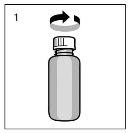
Montagem do dosificador no frasco:
Sacar o dosificador da bolsa de plástico (fig.2) e colocá-lo em cima do frasco. Introduzir para baixo o tubo de plástico cuidadosamente dentro do frasco. Manter o dosificador no gargalo do frasco e girar no sentido das agulhas do relógio até que esteja unido firmemente (fig.3). O dosificador só deve ser enroscado uma vez ao iniciar o uso e nunca deve ser desenroscado.
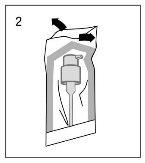
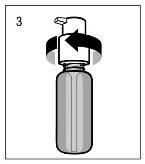
Como funciona o dosificador:
A cabeça do dosificador tem duas posições e gira facilmente
- direção contrária ao sentido das agulhas do relógio para abrir
- direção no sentido das agulhas do relógio para fechar
A cabeça do dosificador não deve ser pressionada para baixo enquanto estiver na posição fechada. A solução só pode ser dispensada na posição aberta. Para abrir, girar a cabeça do dosificador na direção que indica a seta até que não se possa mais (cerca de um oitavo de giro, fig.4). O dosificador está então pronto para uso.
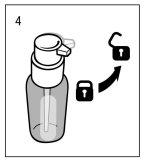
Preparação do dosificador:
Quando é utilizado pela primeira vez, o dosificador não dispensa a quantidade correcta de solução oral. Por isso, deve ser preparado (carregado) pressionando a cabeça do dosificador para baixo completamente durante cinco vezes seguidas (fig.5).
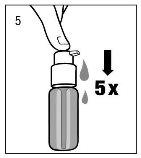
A solução assim dispensada deve ser descartada. A próxima vez que a cabeça do dosificador for pressionada para baixo completamente (equivalente a uma pulsão), já dispensa a dose correcta (fig.6).
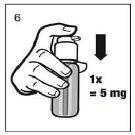
Uso correcto do dosificador:
Colocar um copo com um pouco de água ou uma colher debaixo da boquilla. Pressionar a cabeça do dosificador para baixo firmemente mas tranquilamente e de forma sustentada, não demasiado devagar (fig.7, fig.8).
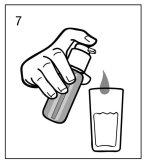
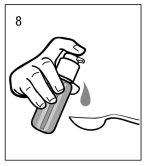
A cabeça pode então ser solta e está pronta para a próxima pulsão.
O dosificador deve ser usado apenas com memantina solução no frasco fornecido, não para outros produtos ou envases. Se o dosificador não funcionar correctamente, consulte o seu médico ou farmacêutico. Feche o dosificador após usar memantina.
Posologia para pacientes com insuficiência renal
Se padece problemas nos rins, o seu médico decidirá a dose apropriada para a sua condição. Neste caso, o seu médico deve controlar periodicamente a função renal.
Administração
Memantina Stada deve ser administrada por via oral uma vez ao dia. Para sacar o máximo proveito do seu medicamento, deve tomá-lo todos os dias e à mesma hora. A solução deve ser tomada com um pouco de água. A solução pode ser tomada com ou sem alimentos.
Duração do tratamento
Continue tomando memantina enquanto for benéfico para si. O médico deve avaliar os efeitos do seu tratamento periodicamente.
Se tomar mais Memantina Stada do que deve
Em caso de sobredose ou ingestão acidental, consulte imediatamente o seu médico ou farmacêutico ou ligue para o Serviço de Informação Toxicológica, telefone 91 562 04 20, indicando o medicamento e a quantidade ingerida.
Em geral, tomar uma quantidade excessiva de memantina não deve provocar-lhe qualquer dano. Pode experimentar um aumento dos sintomas descritos na secção 4 “Possíveis efeitos adversos”.
Se esquecer de tomar Memantina Stada
Se se aperceber de que esqueceu de tomar a sua dose de memantina, espere e tome a próxima dose à hora habitual.
Não tome uma dose dupla para compensar a dose esquecida.
Se interromper o tratamento com Memantina Stada
Se desejar interromper o tratamento antes de terminar o curso do tratamento, fale com o seu médico ou farmacêutico.
Se tiver alguma outra dúvida sobre o uso deste medicamento, pergunte ao seu médico ou farmacêutico.
4. Possíveis efeitos adversos
Como todos os medicamentos, este medicamento pode produzir efeitos adversos, embora nem todas as pessoas os sofram.
Em geral, os efeitos adversos observados são de leves a moderados.
Frequentes (afecta a entre 1 e 10 de cada 100 pacientes):
Dor de cabeça, sono, constipação, provas de função hepática elevadas, tontura, alteração do equilíbrio, respiração difícil, tensão alta e hipersensibilidade ao medicamento.
Pouco frequentes (afecta a entre 1 e 10 de cada 1.000 pacientes):
Cansaço, infecções por fungos, confusão, alucinações, vómitos, alteração da marcha, insuficiência cardíaca e formação de coágulos no sistema venoso (trombose/tromboembolismo venoso).
Muito raros (afecta a menos de 1 de cada 10.000 pacientes):
Convulsões.
Frequência não conhecida (a frequência não pode ser estimada a partir dos dados disponíveis):
Inflamação do pâncreas, inflamação do fígado (hepatite) e reações psicóticas.
A doença de Alzheimer tem sido relacionada com depressão, ideia suicida e suicídio. Tem sido notificado o aparecimento destes acontecimentos em pacientes tratados com memantina.
Comunicação de efeitos adversos
Se experimentar qualquer tipo de efeito adverso, consulte o seu médico ou farmacêutico, mesmo que se trate de efeitos adversos que não aparecem neste prospecto. Também pode comunicá-los directamente através do sistema nacional de notificação incluído no Sistema Espanhol de Farmacovigilância de Medicamentos de Uso Humano: https://www.notificaram.es. Mediante a comunicação de efeitos adversos, você pode contribuir para fornecer mais informações sobre a segurança deste medicamento.
5. Conservação de Memantina Stada
Mantenha este medicamento fora da vista e do alcance das crianças.
Não utilize este medicamento após a data de validade que aparece no envase e no frasco após CAD. A data de validade é o último dia do mês que se indica.
Este medicamento não requer condições especiais de conservação.
Uma vez aberto, o conteúdo do frasco deve ser utilizado em máximo 12 semanas.
O frasco com o dosificador montado deve ser guardado e transportado apenas em posição vertical.
Os medicamentos não devem ser jogados nos esgotos nem na lixeira. Deposite os envases e os medicamentos que não precisa no Ponto SIGRE da farmácia. Em caso de dúvida, pergunte ao seu farmacêutico como se livrar dos envases e dos medicamentos que não precisa. Desta forma, ajudará a proteger o meio ambiente.
6. Conteúdo do envase e informações adicionais
Composição de Memantina Stada
O princípio ativo é hidrocloruro de memantina.
Cada pulsão do dosificador (uma pulsão) libera 0,5 ml de solução contendo 5 mg de hidrocloruro de memantina, equivalente a 4,16 mg de memantina. Cada ml de solução contém 10 mg de hidrocloruro de memantina.
Os outros componentes são sorbato potásico (E202), sorbitol líquido (não cristalizable) (E420) e água purificada.
Aspecto do produto e conteúdo do envase
Memantina Stada solução oral apresenta-se em forma de solução transparente, incolora de cor amarelenta.
Memantina Stada solução oral está disponível em frascos de 50 ml, 100 ml ou de 10 x 50 ml.
Está incluído um dosificador.
Pode ser que apenas alguns tamanhos de envases estejam comercializados.
Titular da autorização de comercialização e responsável pela fabricação
Titular da autorização de comercialização
Laboratório STADA, S.L.
Frederic Mompou, 5
08960 Sant Just Desvern (Barcelona)
Espanha
Responsável pela fabricação
Chanelle Medical
Loughrea, Co. Galway
Irlanda
ou
STADA Arzneimittel AG
Stadastrasse 2 – 18, 61118 Bad Vilbel,
Alemanha
ou
Clonmel Healthcare Ltd
Waterford Road, Clonmel, Co. Tipperary
Irlanda
ou
Centrafarm Services B.V.
Van de Reijtstraat 31-E
4814 NE Breda
Holanda
Este medicamento está autorizado nos estados membros do Espaço Económico Europeu com os seguintes nomes
Irlanda: Memantine Clonmel 10 mg/ml Oral Solution
Holanda: Memantine CF 10 mg/ml, drankPortugal: Memantina Ciclum
Espanha: Memantina Stada 5 mg/pulsão, solução oral EFG
Malta Memantine Clonmel 10 mg/ml oral solution
Data da última revisão deste prospecto: abril 2021
A informação detalhada e actualizada deste medicamento está disponível na página Web da Agência Espanhola de Medicamentos e Produtos Sanitários (AEMPS) http://www.aemps.gob.es/
- País de registo
- Substância ativa
- Requer receita médicaSim
- Fabricante
- Esta informação é apenas para referência e não constitui aconselhamento médico. Consulte sempre um médico antes de tomar qualquer medicamento. A Oladoctor não se responsabiliza por decisões médicas baseadas neste conteúdo.
- Alternativas a MEMANTINA STADA 5 mg/dose SOLUÇÃO ORALForma farmacêutica: COMPRIMIDO, 10 mgSubstância ativa: memantineFabricante: Merz Pharmaceuticals GmbhRequer receita médicaForma farmacêutica: COMPRIMIDO, 10 mgSubstância ativa: memantineFabricante: Merz Pharmaceuticals GmbhRequer receita médicaForma farmacêutica: COMPRIMIDO, 20 mgSubstância ativa: memantineFabricante: Merz Pharmaceuticals GmbhRequer receita médica
Alternativas a MEMANTINA STADA 5 mg/dose SOLUÇÃO ORAL noutros países
As melhores alternativas com o mesmo princípio ativo e efeito terapêutico.
Alternativa a MEMANTINA STADA 5 mg/dose SOLUÇÃO ORAL em Polónia
Alternativa a MEMANTINA STADA 5 mg/dose SOLUÇÃO ORAL em Ukraine
Médicos online para MEMANTINA STADA 5 mg/dose SOLUÇÃO ORAL
Avaliação de posologia, efeitos secundários, interações, contraindicações e renovação da receita de MEMANTINA STADA 5 mg/dose SOLUÇÃO ORAL – sujeita a avaliação médica e regras locais.












